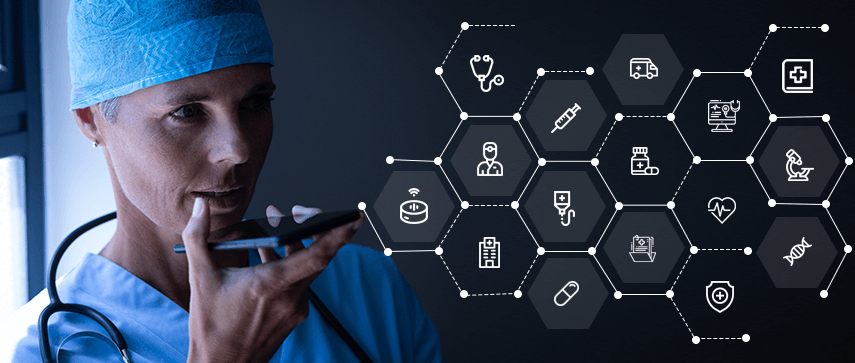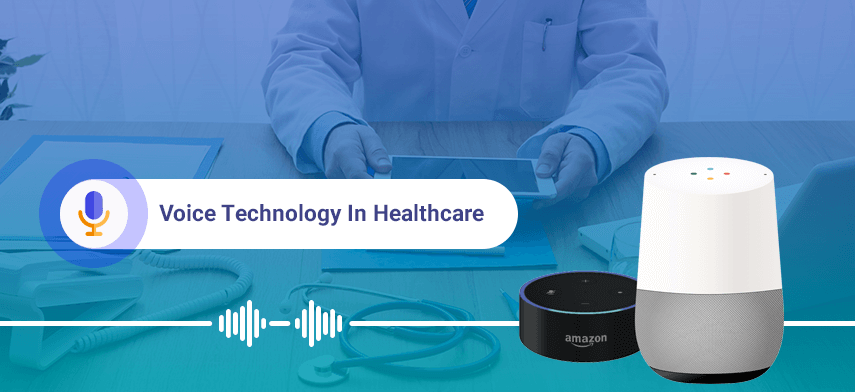With cutting edge artificial intelligence upgrading our lives above mediocrity, voice technology emerges out to be the healthcare stalwarts of the future. From handling follow up calls to medical triage, booking appointments, and even diagnosis, VUI (Voice User Interface) is the perfect combination of medical knowledge with technology and tones of conversation to be the voice of the healthcare industry.
Opportunities, When Voice Search Associates With Healthcare
Voice assistants like Alexa, Siri, and Google Assistant have opened up a myriad of opportunities that could be infused with the healthcare industries. Voice technology helps you do everything from setting up alarms for shopping online, to keeping track of your daily timetable. More than 30% of online browsing is through voice searches today, and the use of voice-assistant apps for multiple purposes is increasing at an unprecedented rate. Voice e-commerce or voice shopping has reached over $2 billion in value by the end of 2017, and it will be $40 billion by 2022.
The healthcare industry can also take advantage of the voice search technology to run the front-end and back-end medical operations smoothly. Orbita, with its WYSIWYG editor for creating apps, comes as a boon to insurers, pharma companies, and medical centers. Combining Artificial Intelligence with deep learning, Machine Learning, and natural language made it possible for voice technology to use different accents and ways of speaking. VUIs can go a long way in analyzing behavioral health issues, streamlining patient documentation, and providing optimal personal care to patients. Global healthcare brands like Mayo Clinic, the American Red Cross, Merch, Amgen are strategizing on developing their voice technology products. Mayo has been monetizing health and wellness content to "seamlessly facilitate omnichannel consumer journeys."
What Is Voice Technology?
Voice-based technology is the future. It is the program that interprets, receives, and carries out the voice commands. It enables the human to interact with technology. Voice-recognition technology is much more than basic voice commands like setting up alarms, providing weather information, and organizing the things in a smart device. It has become a gaining ground to most of the industries for internal and external operations.
The healthcare industry is continually progressing towards better patient care by integrating digital solutions. Voice search technology in healthcare will have a significant impact on the patients' care, leading towards personalized care. The process of healthcare voice technology involves interacting with the patient as a consumer and a human at ground zero level. Voice technology goes beyond the transactional Question-Answer session and engages patients in an interactive conversation.
How Does It Work?
Voice searches help in everything from diagnosis to improving documentation. Below is the step by step process of developing a new voice technology:
Step 1:
The problem statement is given to the voice designers, who now build the texture and rhythm of the conversation.
Step 2:
The focus is on the workflow and the ultimate goal. The content is obtained from trusted content providers to enable a smooth flow of clinical-grade content.
Step 3:
The voice designer drafts a script with dialogues, probable responses from the patients, and the content of the call. Thus, the highly branched decision trees are planned.
Step 4:
The developer builds the code, and the actor records the responses.
Step 5:
Appropriate tones with the required modulation are selected.
A voice that would motivate a patient to give up smoking might be different from the one that is dealing with a patient suffering from coronary diseases. The complexity and humanness of the VUI are what differentiates it from chatbots.
You can use the technology for multiple purposes. For instance, the smart voice tech assistant can help to capture clinical notes, while updating Electronic Medical Records and working silently in the background. It allows medical professionals to focus more on the patients than fill up forms.
Voice Search And Market Statistics
Do you know that the global market for voice search devices grew by an astounding 187% in the last three months of 2018? Voice search is getting popular, and so is the demand for quality voice applications for healthcare. A report from Edison Research and NPR shows that 53 million people in the United States own a smart speaker, mostly Amazon Echo or Google Home. Gartner predicted that 30% of web browsing would be via voice by 2030.
So why not tap the potential and implement in healthcare startups, making them smart and technically advanced. Boston Children's Hospital and Cedars-Sinai Medical Centre have already harnessed the benefits of voice search using platforms like Aiva Healthcare and Sopris Health.
Is Voice Technology The Best Fit For Healthcare?
Voice recognition technology in healthcare is a revolutionary approach. Let us understand how it is the best fit for healthcare:
i. Speed
Compared to logging in to a workstation or opening up an app, voice technology offers a much more speedy and efficient way to provide you with the solution. Be it the dosage of the medicine or some quick advice on a health issue, voice search has emerged successful with its speed and accuracy.
ii. Location
Choosing the proper location for placing the smart speaker is essential. If placed at too lonely a sight, fetching it for emergencies may pose a problem, whereas in hospitals, the ambient noises may generate unnecessary responses.
iii. Reliability
Being able to trust the source is essential, and voice tech can help to do just that. Voice apps can help indicate sources quickly, and help people know which sources to trust and which do not. Most voice tech apps work directly with clinicians on the content to ensure better and accurate results.
iv. Compliance and Security
Having an organization's security and compliance teamwork in a voice project is sure to help in better implementation. Healthcare organizations need to invest in solutions that are HIPAA compliant, and voice-based applications can do what they aim to do while being legally compliant.
Problems That Voice Technology Can Solve In Healthcare

The prime reason behind voice technology upholding the healthcare industry is its ability to solve the different issues.
-
Improves Healthcare Plans
Statistics show that nonadherence to care plans for chronic conditions is almost 50% of the total patients, which causes a significant loss of about 100 to 290 billion dollars to the healthcare industry. The voice technology seeks to monitor the patient for the crucial first 24 hours to ensure adherence to the medical plan as prescribed.Questions popping up like "Did they take up the medication?" , "Will they continue to further?" or "How is the patient responding to the side effects of the medicines?" are taken care of by the virtual healthcare assistant.
Reducing the Load of Manual Documentation
Doctors are known to spend hours each week for documenting patient interactions in EHR. Fatigue and burnout set in when they are bulldozed with burgeoning paperwork. Google's Eric Schmidt said that smart listening devices in examination rooms could be beneficial. Voice apps can create encounter notes in less than 45 seconds, by transcribing data received by dictation.
Helps as a Local Biomarker
Analysis of the rate and pitch of speech and the repetition of words by galvanic voice technology can detect Parkinson's disease, depression, concussion, post-traumatic stress disorders with accuracy and can track the progression of the disease with promising results.
Streamlines Communication
The patient satisfaction index is directly proportional to the financial performance of hospitals. A report by Deloitte captures that hospitals with a five-star rating generate $444 more revenue per patient. Outpatient facilities are struggling to optimize patient satisfaction index by implementing voice technology for back-office operations.
Smart and Safe
Intensive Care Unit can be rendered contamination-free, with immediate and hands-free access to information using voice technology. Instead of searching through piles of files, the nurse can simply ask a question to the smart speaker, which would search through the trajectory of documents and reply back. It would also guide the care providers in case of emergency situations. Stay smart, Stay safe.
More Productivity
Train the technology and be an efficient staff manager. Experience productivity like never before! The Voice Recognition app can detect stress and fatigue from the conversation of nurses and caregivers and can give them stress buster tips or prompt them to relax and then come back with rejuvenated vigor.
Voice Technology Applications
Voice applications for the healthcare are on their way to routing the appropriate care service to patients.
1 Used to Diagnose Better
Taking down notes and retrieving important data can become more manageable. Not only physicians can take down notes through voice, but nurses can also get access to essential patient data with simple voice commands.
2 Help to Document Properly
Voice apps can ask questions to patients in a bid to help track patient behavior daily. This can, in turn, help monitor patient health better. Also, for medical professionals, voice apps can identify billing codes and offer clinical decision support, saving up more time.
3 Improve Interactions with Patients
Creating a positive user experience is vital to the healthcare industry. Voice-enabled mobile apps or voice recognition software can help patients with everything from appointment booking to eligibility checks and carrying out back-end tasks efficiently.
4 Improving Staff Productivity
AI-powered Voice tech can help understand where the staff is stressed out, and help the management to make the right changes. For instance, the devices can see the tone and pitch of nurses when dealing with patients, to understand the stress level.
Benefits
The healthcare providers, individual doctors, insurance companies, pharmacies can reap the benefits offered by voice search technology in healthcare as mentioned hereunder:
Aid to Doctors
By documenting patient interactions, collecting data given to it as dictation from doctors and transcribing those in EMR, voice technology in the examination room of physicians reduce their burnout and allow them to focus more on the diagnosis of pain. They come in the form of mobile-based applications and are hence cost-effective. Sopris Health, MDOps, Kiroku, Tenor.ai convert auditory data to clinical notes, thus relieving the physicians from the stress of paperwork and documentation.
Diagnosis of Diseases
Analysis of the speech quality, tone, repetition gives voice technology the unique power to detect degenerative diseases like Parkinson’s disease, Alzheimer’s disease, stress, depression, and the likes. The technology-powered virtual healthcare assistant is quick, accurate, and efficient in diagnosing such disorders.
Suggesting Care Plan
Voice technology helps monitor patients to get real-time insights into their health conditions and relay the same to the doctors. It can persuade the patient to adhere to the prescribed medication, provide suggestions to overcome the adverse side effects of drugs, remind the aged about the regular dosage of medicine and even guide the patient during emergency situations. The smart voice can also prepare personalized care plans for its users.
Digitization of the Healthcare Industry
Reaching out to the entire patient population, handling their appointments, medical triage, booking appointments for their clinical tests can be voluminous a task for the care-providers of the healthcare centres. So why not digitise it? The entire chain of communication and streamlining patients is the onus of voice technology when Orbita wields its smart power.

Helps the Aged and Differently Abled
Out of 47.8 million people aged above 65 years in the US, as of a survey in July 2015, 85% suffers from at least one chronic degenerative disease while 60% are distressed with more than one chronic condition. The rate of hospitalization of the elderly is double than the age group of 45 to 64 years.
11.3 million people in the senior age group section suffer from loneliness, and 1.3 million reside in nursing homes with curtailed independence. Voice technology-based healthcare apps like Podlife, Reminder Rosie are no wonder the remedy for such aged group to monitor their daily routines, reminding them to take medicines and providing them healthcare tips.
A 2012 National Health Interview Survey shows that 1 out of 12 children between 3 and 17 years, and about 17.9 million adults have speech disabilities. A World Health Organisation study estimates that 466 million people suffer from hearing impairments. The tryst of voice technology with healthcare, yielding Talkitt, Voxello, VocaliD forms the modern Braille system by comprehending nonstandard speech and providing live subtitles.
Redefining Health
Better and improved healthcare industry is on the go to renovate the conventional healthcare modes. Artificial intelligence backed tools, smart and friendly Alexa, voice apps with medical proficiency are dominating the market. The integration of voice technology with the medical arena can bring about revolutionary changes. From understanding patient behavior to comprehending the effects of the drug, recognizing health emergencies and setting up appointments, voice technology will lead to a paradigm shift in the present model of the healthcare industry.
So pull up your socks! The next time you receive a follow-up call from a hospital may not be someone of flesh and blood. It may be a chatbot trained to converse with you and give you pills for a happy and healthy life. Talk to one of our representatives to integrate customized voice technology solutions for your business.






 January 1, 2020
January 1, 2020


